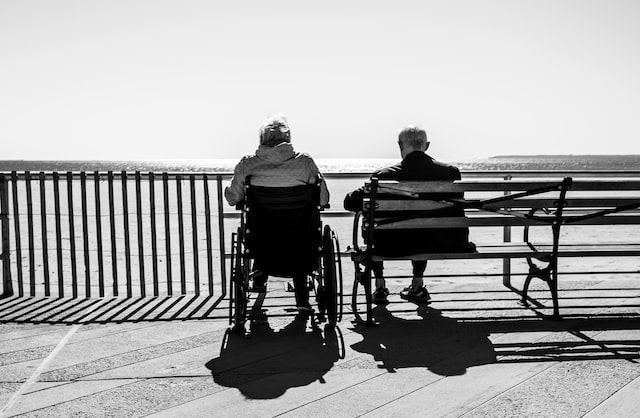Submissions open on review of Adult Decision-Making Capacity Law
Thu 16 Feb 2023
Te Aka Matua o te Ture | the Law Commission is asking for feedback on how the law should respond when an adult’s decision-making is affected. The consultation closes on 3 March 2023.

Consultation on decision-making capacity law
The Minister of Justice asked Te Aka Matua o te Ture | the Law Commission to review the law related to adult decision-making capacity. The Law Commission is asking for feedback on how the law should respond when an adult's ability to make decisions is affected.
The closing date to submit feedback is 3 March 2022.
An adult's decision-making could be affected by dementia, acquired brain injuries, learning disabilities and experiences of mental distress. The Law Commission notes that
"If an adult’s decision-making is affected, the law may treat their decisions differently. This is based on a concept of ‘decision-making capacity’. If a person is assessed not to have ‘decision-making capacity’, their decision might not have legal effect. Another person might be appointed to make the decision for them."
Some of the things that the Law Commission is asking for feedback on include:
- supported decision-making
- advance directives
- enduring powers of attorney
- welfare guardians
- safeguards and accountability mechanisms.
In the Terms of Reference, the Law Commission states they are looking at whether Aotearoa New Zealand law and practice strike an appropriate balance between:
"● enabling people to make decisions about their own lives (including with appropriate support from whānau, family, carers and caregivers, other professionals or the wider community); and
● safeguarding people from harm."
The Law Commission has published a Preliminary Issues Paper which includes background and questions. In the issues paper the Law Commission outlines 7 principles for the review. One of these principles is "Keep people safe from abuse and neglect and promote accountability." In discussing this principle, the Law Commission identifies that people with affected decision-making can be vulnerable to abuse and neglect. This includes older people and disabled people. Chapter 8 of the issues paper looks at safeguards and accountability and asks questions related to elder abuse.
When a person’s ability to make decisions is affected, they may be at risk or vulnerable to abuse, violence and neglect. Abusers' use of decision-making powers to coerce or a control a person can be understood as forms of elder abuse, family and/or intimate partner violence. See further information in the background below.
The Terms of Reference also outline the scope, or what the review will include:
- "Ao Māori perspectives on decision-making capacity and its regulation, including how the law should address any matters of particular concern to tāngata whaikaha Māori, their whānau, hapū and iwi, and Māori more generally.
- How the law should recognise and provide for te Tiriti o Waitangi | the Treaty of Waitangi.
- How the law should protect and promote human rights, including consideration of:
- Aotearoa New Zealand’s international human rights commitments, particularly under the Disability Convention and the United Nations Declaration on the Rights of Indigenous Peoples; and
- Domestic human rights laws, particularly the New Zealand Bill of Rights Act 1990 and Human Rights Act 1993.
- The language used in our law.
- How to assess a person’s ability to make decisions about exercising legal rights and duties.
- How the law should facilitate and regulate the provision of support to people who require support to be able to exercise legal capacity on an equal basis.
- How the law should recognise the role of whānau, hapū and iwi, family, carers and caregivers, and the wider community in the provision of such support.
- How the law should regulate the exercise of legal capacity in rare circumstances where decisions may need to be made on behalf of a person.
- What safeguards the law should provide around measures relating to the exercise of legal capacity.
- How the law should regulate situations where people, whose ability to make decisions may be limited, are deprived of their liberty (other than in the context of criminal proceedings)."
The review will consider the following legislation:
- Protection of Personal and Property Rights Act 1988
- Mental Health (Compulsory Assessment and Treatment) Act 1992
- Substance Addiction (Compulsory Assessment and Treatment) Act 2017
- Health and Disability Commissioner Act 1994 and the Code of Health and Disability Services Consumers’ Rights established under that Act
There are many ways to have your say. You can complete an online form, fill in a form in Word, email, text or write by post. See the website for more details.
This is the first public consultation. The Law Commission plans to run a second public consultation this year. This will include a longer consultation document that will address the current law in more detail and propose options for reform. After the second consultation, the Law Commission will provide a final report with recommendations to the Government. The Law Commission expects to submit the final report to the Minister of Justice by 30 June 2024.
Update:
Some organisations have made their submissions public including the Disabled Persons Assembly NZ and the Family Violence Death Review Committee.
Update:
The Law Commission open consultation on a Second Issues Paper 52. This paper looks at the current law in much more detail and suggests possible options for reform. Find more information on the Review of Adult Decision-Making Capacity Law | Ngā Huarahi Whakatau.
Background
The Community Law Manual provides an overview about the law when other people can legally make decisions for you in Aotearora New Zealand. See more information from Firstport about support decision making.
The report, Diversity, dignity, equity and best practice: a framework for supported decision-making (2023), looked at supported decision-making for people with cognitive disabilities in Australia. The report summarises findings from a literature review, online survey of research and practice networks, and focus groups and interviews with people with cognitive disabilities, family members, representative groups, policy makers and advocates. The report outlines the benefits of supported decision-making, sets out nine principles and eight essential elements of a ‘Diversity, Dignity, Equity and Best Practice Framework for Supported Decision-making’ and recommends implementation strategies. It was funded by the Australian Royal Commission into Violence, Abuse, Neglect and Exploitation of People with Disability. The report is available in an easy read format and a video with sign language interpretation.
Article 12 of the UN Convention on the Rights of Persons with Disabilities addresses the rights of persons with disabilities to legal capacity or decision-making including the right to support and safeguards to prevent abuse. General Comment No. 1 from the UN Committee on the Rights of Persons with Disabilities provides further detail on Article 12 of the Convention.
The Office for Disability Issues | Te Tarī Mō Ngā Take Hauātanga gives an overview of the previous work done to improve disabled people's exercise of legal capacity and the move from substitute decision-making to supported decision making.
The report, Women, disability and violence: barriers to accessing justice (2018), discusses how denial of and problematic assumptions about legal capacity for disabled people increases risks for violence and impacts ability of victim/survivors to report and get legal assistance. For more information see the following:
- Not inherently vulnerable : an examination of paradigms, attitudes and systems that enable the abuse of dis/abled women (2017) by Debbie Hager
- Gendered denials: Vulnerability created by barriers to legal capacity for women and disabled women (2019) by Anna Arstein-Kerslake
Article 15 of the UN Convention on the Elimination of All Forms of Discrimination against Women addresses women's right to equal legal capacity. For more information see the book Legal Capacity & Gender: Realising the Human Right to Legal Personhood and Agency of Women, Disabled Women, and Gender Minorities (2021).
The UN Independent Expert on the enjoyment of all human rights by older persons identifies the limitation or denial of the right to legal capacity as a deprivation of liberty in her Report on older persons deprived of their liberty (2022). She also highlights the duty of States to establish safeguards to ensure informed consent for older persons. The General recommendation No. 27 on older women and protection of their human rights from the UN Committee on the Elimination of Discrimination against Women highlights that "Older women are particularly vulnerable to exploitation and abuse, including economic abuse, when their legal capacity is deferred to lawyers or family members, without their consent." The Recommendation also calls on States to "...ensure that older women are not deprived of their legal capacity on arbitrary or discriminatory grounds."
The report Elder Abuse in Aotearoa: The role and current state of MSD’s Elder Abuse Response Services (2019) identifies elder abuse risks from Enduring Power of Attorney.
For more information see the following:
- The role of financial planners in preventing, recognising and responding to elder financial abuse (2021) by Tina Cockburn, Kelly Purser, Sherrena Buckby and Kirsty Paynter [Australia]
- Examining access to formal justice mechanisms for vulnerable older people in the context of enduring powers of attorney (2020) by Kelly Purser, Tina Cockburn, and Elizabeth Ulrick [Australia]
- The Human Rights of Older Persons: A Human Rights-Based Approach to Elder Law (2020) by Lewis Bridget, Kelly Purser and Kirsty Mackie.
Update: Also see Enabling Disabled People to Live Good Lives: Embedding supported decision-making into disability law in Aotearoa, New Zealand by Frankie Karetai Wood-Bodley.
Update: The Family Violence Death Review Committee (FVDRC) published a position paper in August 2023 on Responding to adults at risk who need care and support and who are experiencing family violence. It gives an overview of the issues associated with (mis)identifying adults at risk who need care and support and who are experiencing family violence. It highlights the need to look carefully at situations where the capacity, capability and wellbeing of both the carer and the adult at risk are in question.
Also see the book chapter Who do we turn to? Safeguarding residents in aged care settings from abuse and neglect in New Zealand by Kate Diesfeld published in September 2023.
Related news
The UN Independent Expert on the enjoyment of all human rights by older persons is calling for inputs on violence, abuse and neglect of older persons to inform a report. Inputs are due by 1 March 2023.
Manatū Wāhine | Ministry for Women is inviting feedback on New Zealand's draft 9th report on progress related to the Convention on the Elimination of All Forms of Discrimination Against Women (CEDAW). Feedback is due by 24 March 2023.
Related media
Kiwis treated under compulsory care laws hits record high, Newsroom, 13.10.2023
UN expert calls for ‘new philosophy’ to better serve persons with disabilities, UN News, 13.03.2023
Review of adult decision-making capacity law is 'long overdue', Stuff, 17.12.2022
Disability advocates concerned over rise in guardianship applications, Newsroom, 05.07.2022
Image: Ron Lach on Pexels






